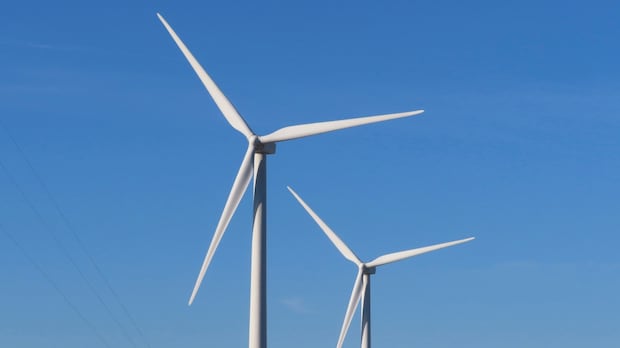Nova Scotia's offshore wind project could cost up to $10B
Premier Tim Houston says project could be transformative, but needs federal support

Premier Tim Houston says his proposal for the construction of hundreds of wind turbines off the coast of Nova Scotia to generate electricity could be transformative for Canada, but would also come with a major price tag requiring the assistance of the federal government.
Houston said initial estimates are in the $5-billion to $6-billion range, but $10 billion isn't out of the question.
The premier released a video about the idea last week and raised it during a recent meeting with the rest of the premiers and Prime Minister Mark Carney, where there were talks about major projects that could benefit the entire country.
"My objective initially was to capture the imagination of Nova Scotians, and I think Nova Scotians are pretty inspired by what's possible," Houston told reporters following a cabinet meeting Thursday in Halifax.
He said federal officials were interested, but what remains to be seen is what kind of support there would be from Ottawa to help make the project a reality. Houston said support could come in the form of backstops on loans or direct investment, but there also need to be conversations about the route for a transmission cable and regulatory process.
"The price of the energy at the end of the day has to be competitive," he said.

If built to full capacity, Houston said turbines in the five areas being examined for development could generate up to 66 gigawatts of energy, with about 44 gigawatts being considered reliable power. Nova Scotia's peak use now is 2.4 gigawatts, he said.
And while demand in the province will continue to go up, the premier said the project would generate more than enough energy to support a proposed green hydrogen industry, supply power to other parts of the country, and meet local needs.
'This could change Nova Scotia'
Houston, who is also supportive of a pipeline that would move western oil to the East Coast, said he thinks Nova Scotians understand that they're beneficiaries of transfer payments that come as a result of energy projects in other parts of the country. The most recent provincial budget pegs Nova Scotia's equalization payments at about $3.5 billion.
"And that money goes to hospitals, it goes toward doctors, it goes toward schools, it goes toward roads, it goes toward all kinds of things that are needed in this province," he said.
A project like the one he's proposing could help eventually transition Nova Scotia from a province receiving equalization to one that pays into the system, said Houston.
"This could change Nova Scotia, it could change Atlantic Canada, and provide green renewable energy that the world is looking for," he said.

Interim Liberal Leader Derek Mombourquette said what the premier is pitching is not a new concept, but project costs along with implications for power rates have been key factors in previous conversations.
"The market really kind of drives this stuff," he told reporters.
Mombourquette said his party is supportive of the concept, but it's vital that there be a way for energy to also be imported from other parts of the country. He said he's concerned that the premier could not be more precise about the potential cost of the project.


